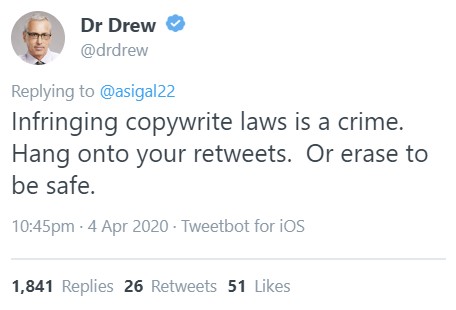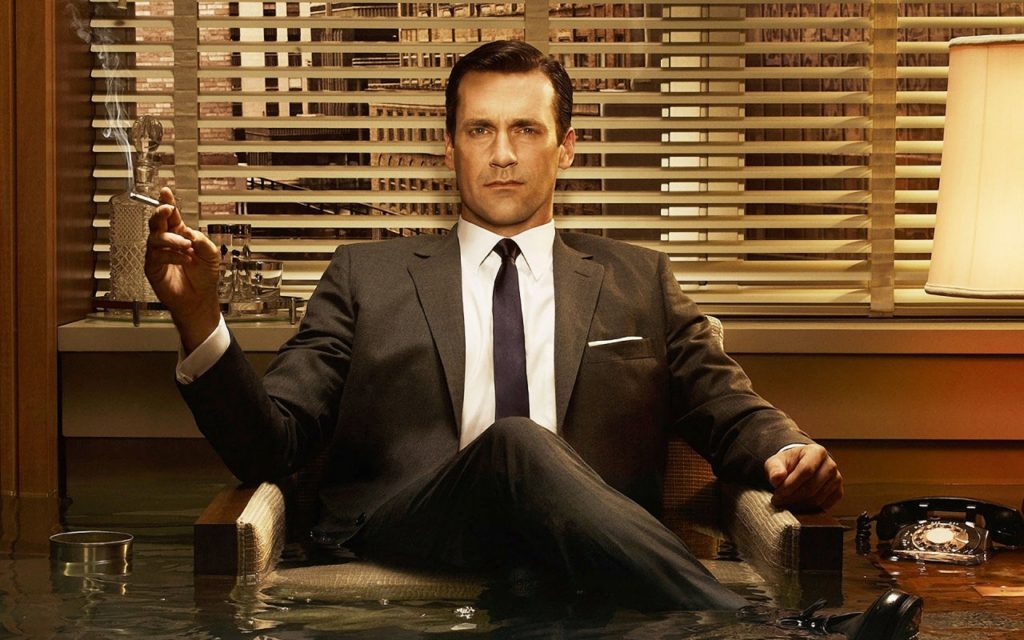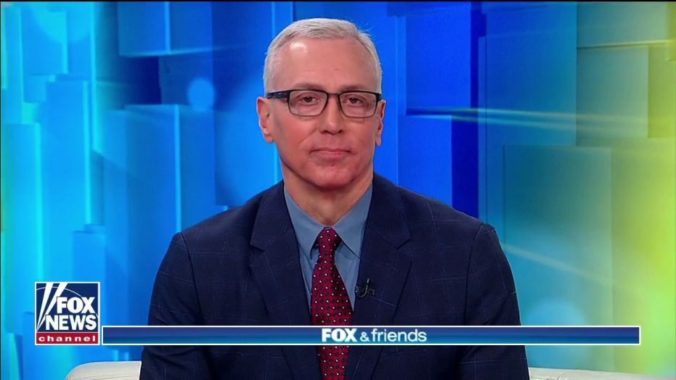The only relevant thing in the news these days is information about COVID-19, the novel coronavirus. More formally known as coronavirus disease of 2019 and the underlying virus causing it: severe acute respiratory syndrome coronavirus 2 (SARS-CoV-2). There has not been much else worthy of writing about or reading about for a couple of months now. This is for good reason. COVID-19 is deadly serious and not to be underestimated.
Someone did not get this memo to multiple talking heads on television and the internet. Truth be told, I am not here to litigate the underlying science of the coronavirus. But I am absolutely here to dunk on those who initially went out of their way to downplay the pandemic only to later engage in lazy revisionist history. There are too many to name, but one in particular caught my attention. Because this person brought the law into it; thus bringing it directly into my area of expertise.
Hello, Dr. Drew. Please take a seat while we discuss “copywrite” laws.

What was the impetus for this tweet reply from the esteemed celebrity television doctor person?
It appears a compilation video began circulating across social media on April 4, 2020. This video shows the, uh, “evolution” of Dr. Drew Pinsky’s personal beliefs about COVID-19, beginning in early February.
(If that video gets deleted, here’s another link)
Amongst Pinsky’s expert opinions in February 2020 were that this coronavirus is “mild; doesn’t hurt anybody” and that it is “way less serious than influenza.” He proudly went on television to espouse these viewpoints to a wide audience. Hence the video above. In short, he was not only wrong but dangerously, irresponsibly, incredibly wrong. These are not matters of opinion anymore: he was wrong. Yes, after getting dragged all across the internet yesterday, he apologized. The internet never forgets, however, and this is where the legal issues come in.
While he did apologize under duress, Dr. Drew (through his company Drew Pinsky Inc.) also issued a multitude of DMCA take-down requests to get the above compilation video temporarily removed from social media, primarily the YouTube links. That led to the above tweet where he threatened to invoke “copywrite” law against someone re-tweeting the incriminating video.
Let us count the ways that Dr. Drew is wrong about copyright law, shall we?
It is spelled “copyright,” doctor
Addressing the easiest one first. “Copywrite” is derived mostly from “copywriting” which according to the unimpeachable resource of Wikipedia is the “act or occupation of writing text for the purpose of advertising or other forms of marketing. The product, called copy, is written content that aims to increase brand awareness and ultimately persuade a person or group to take a particular action.”
This is a copywriter:

Don Draper is not a lawyer.
By way of contrast, “copyright” refers to the legal construct. In layman’s dictionary terms, a copyright is “the exclusive legal right to reproduce, publish, sell, or distribute the matter and form of something (such as a literary, musical, or artistic work).”
There is a difference. It matters.
This is not a criminal copyright offense
Most copyright infringement is a civil offense, not criminal. There are limited exceptions whereby violation of a copyright owner’s exclusive rights can be a criminal violation. These are rare and even more rarely enforced. To qualify as a criminal offense, the law requires the following:
17 U.S.C. § 506(a) Criminal Infringement.—
(1) In general.—Any person who willfully infringes a copyright shall be punished as provided under section 2319 of title 18, if the infringement was committed—
(A) for purposes of commercial advantage or private financial gain;
(B) by the reproduction or distribution, including by electronic means, during any 180–day period, of 1 or more copies or phonorecords of 1 or more copyrighted works, which have a total retail value of more than $1,000; or
(C) by the distribution of a work being prepared for commercial distribution, by making it available on a computer network accessible to members of the public, if such person knew or should have known that the work was intended for commercial distribution.
Re-tweets almost certainly do not qualify as a criminal offense as they are unlikely to be for “purposes of commercial advantage or private financial gain.” The other examples are designed for unauthorized distribution of music and long-form movies. Hollywood has a good lobbyist.
Dr. Drew’s video clips are almost certainly not registered copyrights
Thanks to the short-sighted wisdom of the United States Supreme Court, victims of copyright infringement cannot bring any action for infringement before a U.S. court until the owner of the copyright has already secured a registration for that copyright. In some states, the law used to be that you could sue while an application was pending, but that is no longer the law as of March 4, 2019.[1]
There is no dispute that the individual clips are protected by copyright law. These are visual works fixed in a tangible medium of expression. Copyright law applies. However, my guess is that Dr. Drew and/or his corporate entity has not applied to register any of these copyrighted video clips, much less actually acquired any registrations for same. This also precludes the recovery of any alleged statutory damages (or enforcement of hypothetical criminal penalties) until the registration has been acquired. Tough break, doc.
Is Dr. Drew actually the owner of these copyrighted works?
There are multiple clips in the above video compilation. In each, Dr. Drew is being interviewed by someone or he is making a statement of opinion for widespread dissemination. At least one of these clips was broadcast on Fox News. Another was on a local KTLA Channel 5 news station. Yet another on a FOX 11 local news outlet in Los Angeles. Why is this important?
It is because Dr. Drew is likely not the author or owner of these copyrighted videos.
I will presume that Dr. Drew owns the rights to videos from his “Dose of Dr. Drew” studio show, but the other clips? They do not belong to him. Pursuant to 17 U.S.C. § 106, he has no right to assert any rights concerning these videos. To be clear, since the main video is a compilation of multiple copyrighted works, Dr. Drew is able to assert a DMCA claim because he likely owns at least one of the videos in question. Overall, however, he cannot claim ownership or exclusive rights to the whole compilation video. Take it up with Fox News, buddy.
Fair Use
I saved the most important one for the last. What Dr. Drew Pinsky is trying to accomplish with his DMCA takedown notices and Twitter threats is to silence criticism. He is trying to use these tactics for reasons that are antithetical to everything copyright law stands for.
Copyright law exists to protect works of authorship, including video clips. There is a balance, however. Copyright law also exists to incentivize scholarship, academic commentary and criticism, and to promote newsworthy information – even if the underlying content is based on copyrighted material. This is the Fair Use doctrine. There is an entire statutory section of the Copyright Act dedicated to it: 17 U.S.C. § 107.
Even if a work is protected by copyright law, fair use of that copyrighted work is permissible without authorization or permission and is not an infringement thereof. Fair use is always determined on a case-by-case basis as it is a fact-intensive issue, but the statute provides four main factors to consider in the analysis:
(1) the purpose and character of the use, including whether such use is of a commercial nature or is for nonprofit educational purposes;
(2) the nature of the copyrighted work;
(3) the amount and substantiality of the portion used in relation to the copyrighted work as a whole; and
(4) the effect of the use upon the potential market for or value of the copyrighted work.
The compilation video showing Dr. Drew’s dangerously incorrect expert opinions on the coronavirus are the classic example of “fair use.” There is no better example of using a work for “nonprofit educational purposes.” The good doctor went out of his way to distribute harmful misinformation about a deadly virus, and the video compilation was created to educate the public on Dr. Drew’s lack of credibility on the subject matter. It is unlikely that any money will be generated by making and distributing this video clip across the internet. Only short clips were used as part of the compilation (i.e., entire episodes of “Dose of Dr. Drew” were not used in the process). This is fundamentally a necessary exchange of information for newsworthy purposes.
Copyright law exists to incentivize discussion and creative works. It should not be used as a tool for chilling valid criticism of a public figure. I realize Dr. Drew is not the only public figure to be shamed for bad opinions on COVID-19. I realize he is not even the only one to threaten legal action for being called out (looking at you, Sean Hannity). Dr. Drew is the most public example of someone trying to exploit procedural copyright laws to engage in revisionist history, however.
The internet never forgets. Here is hoping your apology was
sincere and you take positive steps to help enlighten the public on the true
dangers of COVID-19 going forward, Dr. Drew. But stay in your lane when it
comes to copyright law, please. Thank you.
[1] See Fourth Estate Benefit Corp. v. Wall-Street.com, No. 17-571, __ U.S. __, 139 S. Ct. 881, 203 L. Ed. 2d 147 (2019).

Recent Comments